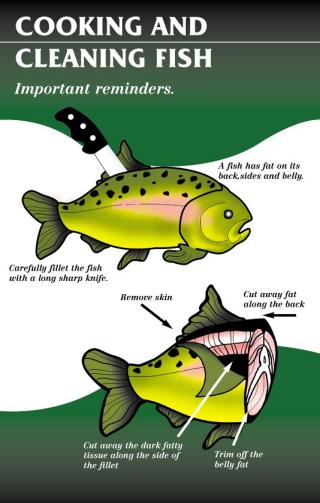How to Protect Your Health While Eating Fish
Main_Content
To reduce the amount of chemical contaminants in all fish you catch, you should:
- Gut the fish.
- Remove the belly flap, skin, and dark meat of your fish prior to eating (see figure in the next column). If polychlorinated biphenyls (PCBs) or similar chemicals are present, they will be concentrated in these fatty portions of the fish.
- Broil, grill, or bake your fish on a rack so that fat (which is where chemicals like PCBs concentrate) can drip away from your dinner.
- Avoid using batter or breading when cooking the fish, because they hold fat drippings, which may contain the chemicals of concern.
 Eat smaller fish, as long as they are within the legal size limit. Larger fish have lived longer than smaller fish and will therefore contain more chemicals.
Eat smaller fish, as long as they are within the legal size limit. Larger fish have lived longer than smaller fish and will therefore contain more chemicals.
- Vary the kinds of fish you eat. Contaminants tend to build up in predators and bottom feeding fish.
- The advisory recommendations are based on evenly spaced (e.g. 4 meals per month) consumption patterns over time. This does not mean that you can safely consume a higher number of meals in one month if you only catch and eat fish 4 months out of the year. If you are a seasonal angler (e.g. summer), freeze a portion of your catch for consumption at a later date to reduce the amount of chemicals consumed over a specific time period.
- The consumption recommendations are for total allowable consumption in a month. It is not on a “per fish species basis”.
- Example:
- Channel Catfish – 2/month
- White Perch – 4 month
- This means that you can either eat 2 catfish meals OR 4 white perch meals OR a combination (1 catfish meal and 2 white perch meals).
- You SHOULD NOT eat 2 catfish meals AND 4 white perch meals.
- Note: Mercury binds to the edible muscle (fillet meat) of the fish. You cannot reduce your exposure to mercury through preparation or cooking modifications.
- When consuming crabs caught in areas with an existing fish advisory, you can minimize your exposure to contaminants by discarding the “mustard” (otherwise known as green gland or hepatopancreas) of the crab.
Contact Information
If you have any questions, contact the Maryland Department of the Environment at 410-537-3906.